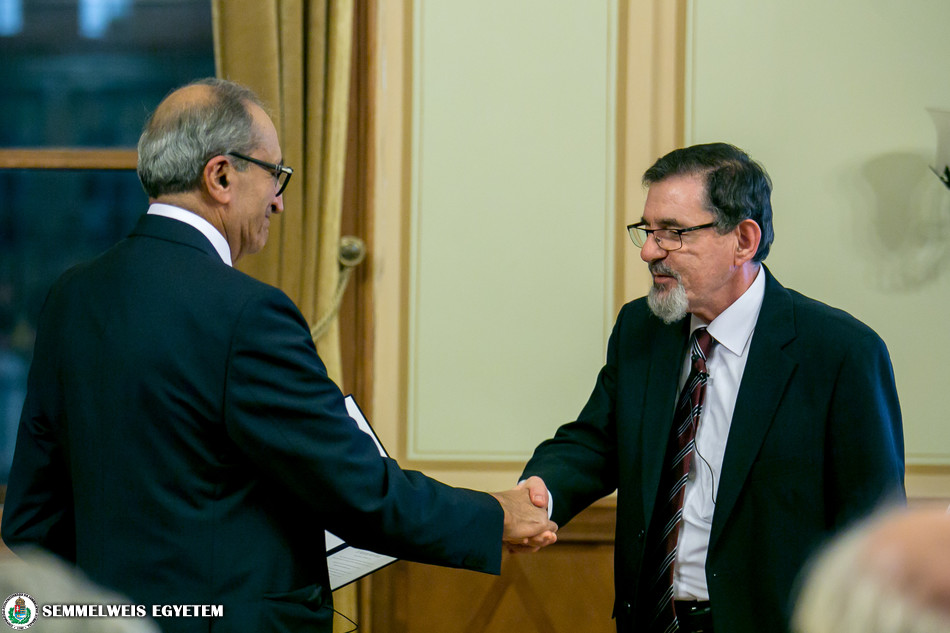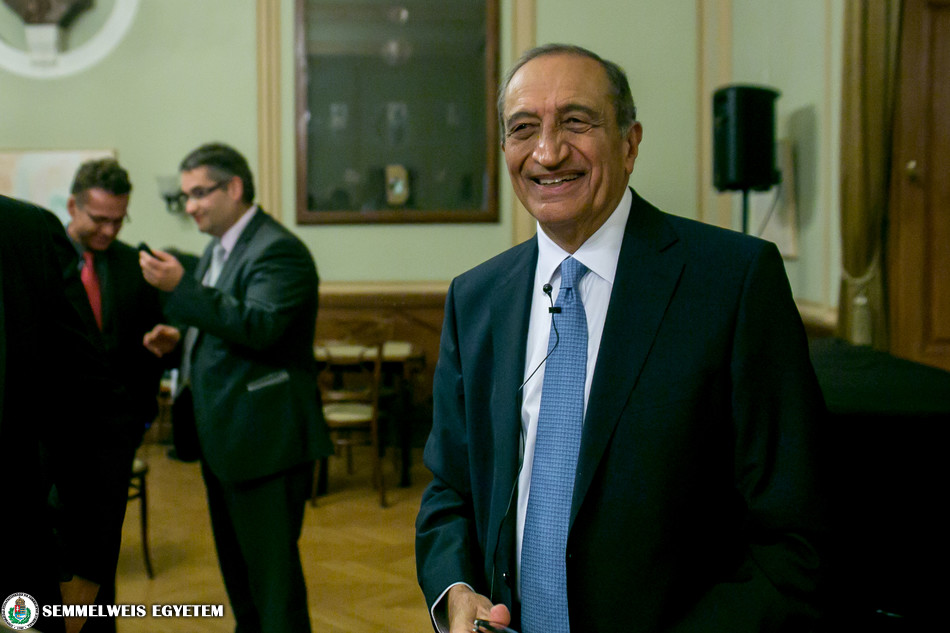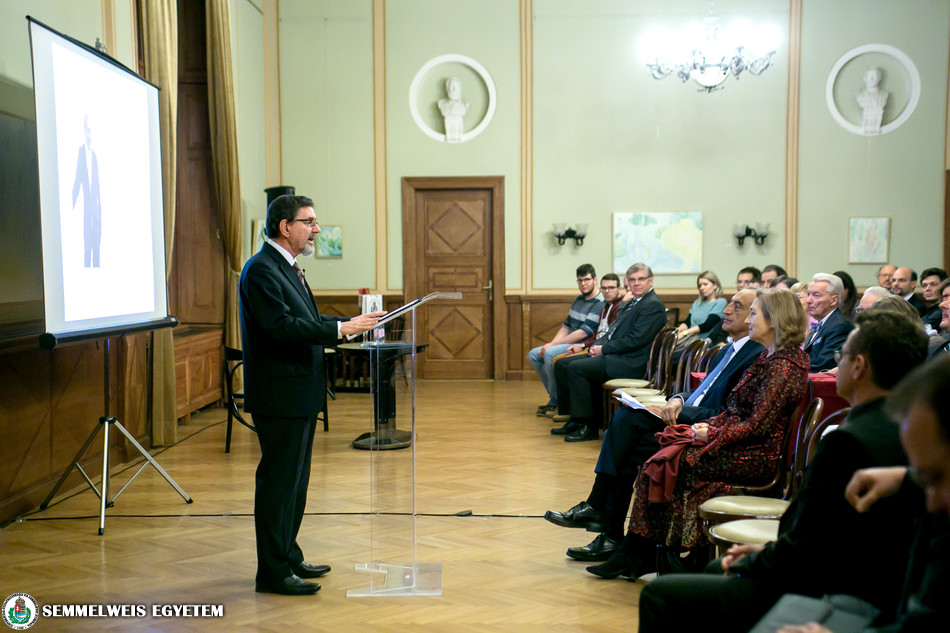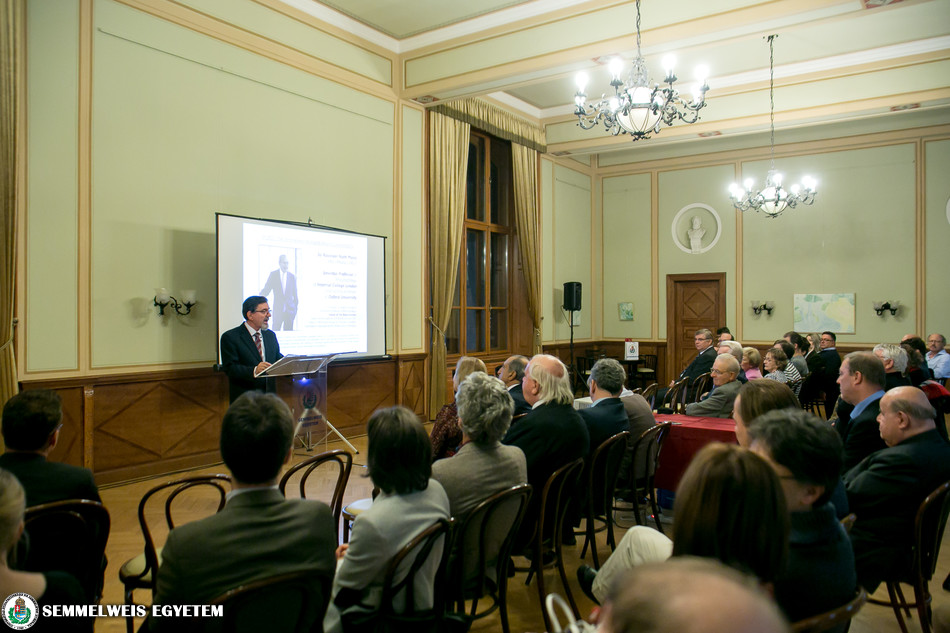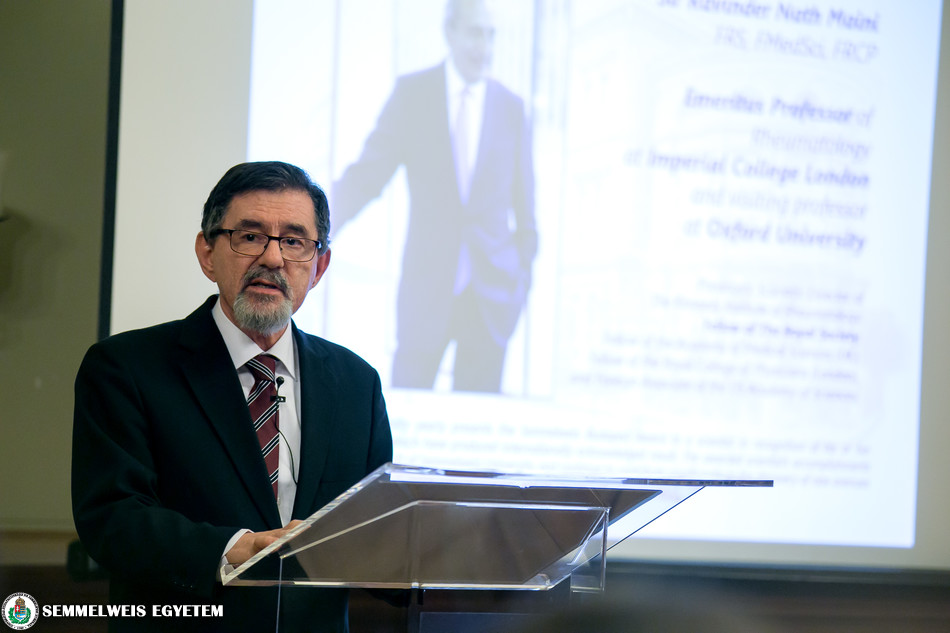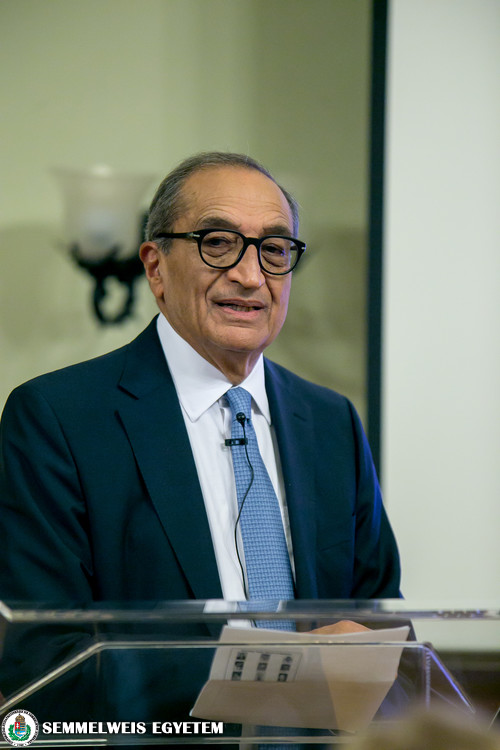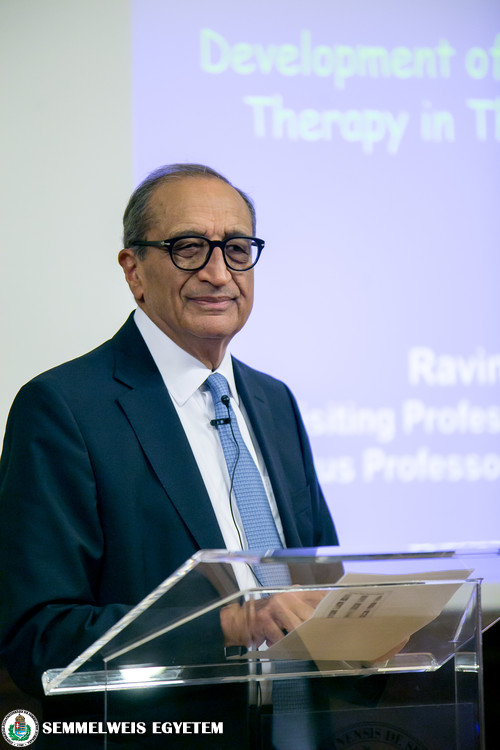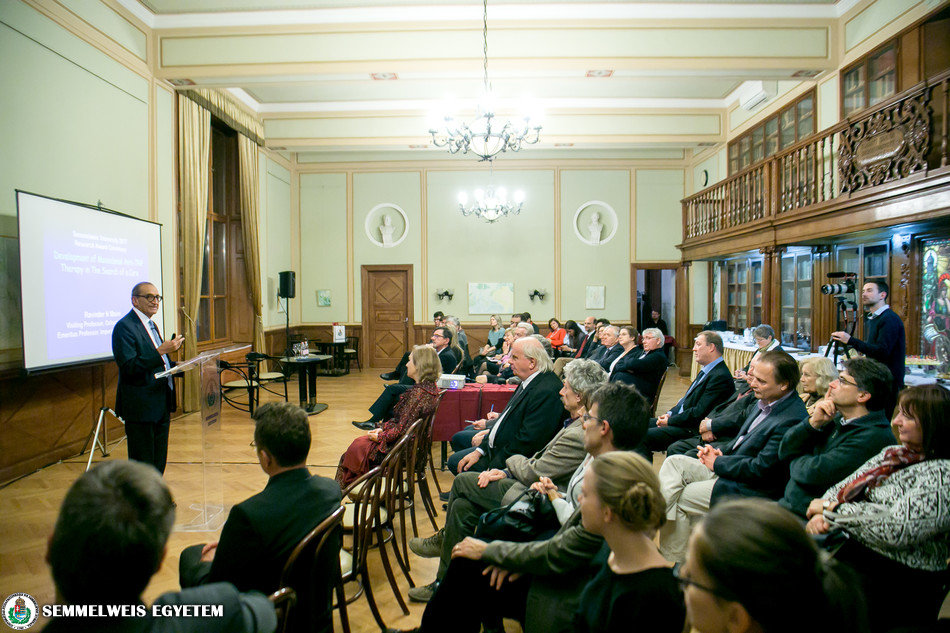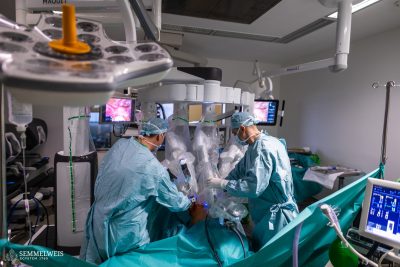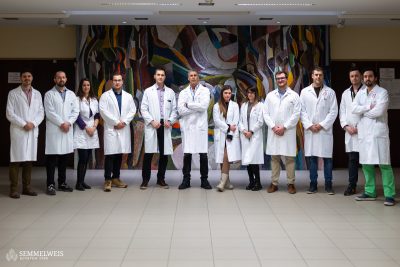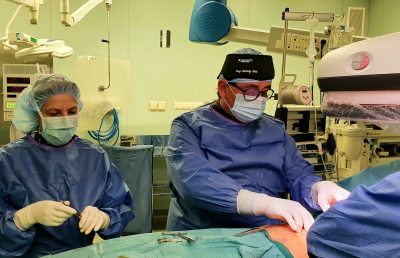Sir Ravinder N. Maini, Professor Emeritus of Imperial College in London, Visiting Lecturer of Oxford University has been awarded Semmelweis Budapest Award in 2017. The scientist was awarded the most prestigious international scientific recognition of Semmelweis University for the development of biological therapies that revolutionized the treatment of inflammatory diseases. During the ceremony, Sir Ravinder N. Maini held his lecture entitled “The development of monoclonal anti-TNF therapy in favour of an efficient treatment”.
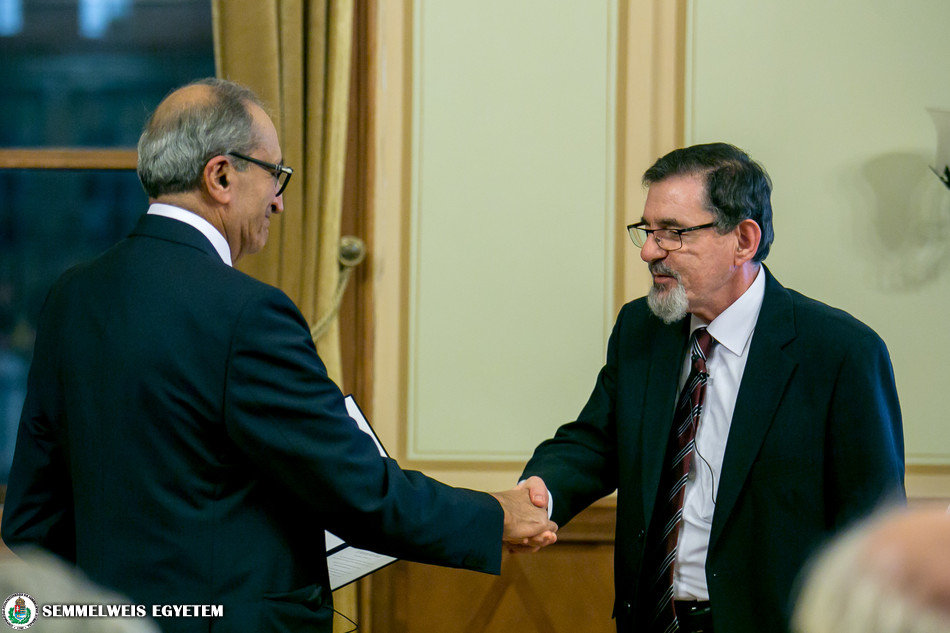 Dr. Ágoston Szél, Rector opened the scientific meeting organized on the occasion of the award ceremony and he announced that the awardee of this year’s Semmelweis Budapest Award was Sir Ravinder N. Maini. The nomination of the professor was uniquely supported by the Senate of Semmelweis University. Rector Szél reminded the audience that this award was founded in 2009 and can be awarded to such internationally renowned scientists working in the area of natural science, whose achievements provide new perspectives for the recognition of living nature and serve the benefit of mankind.
Dr. Ágoston Szél, Rector opened the scientific meeting organized on the occasion of the award ceremony and he announced that the awardee of this year’s Semmelweis Budapest Award was Sir Ravinder N. Maini. The nomination of the professor was uniquely supported by the Senate of Semmelweis University. Rector Szél reminded the audience that this award was founded in 2009 and can be awarded to such internationally renowned scientists working in the area of natural science, whose achievements provide new perspectives for the recognition of living nature and serve the benefit of mankind.
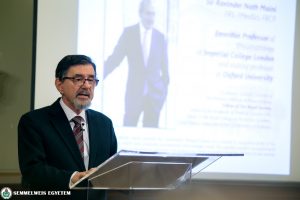 Rector Szél highlighted that Professor Maini’s scientific activities are connected to Budapest and the Hungarian scientific scene in many respects. The Kennedy Institute of Rheumatology, of which Professor Maini was the Director earlier, provided several Hungarian researchers with scholarships and therefore enabled them to learn first-hand more about the new therapy solutions of inflammatory diseases. Sir Ravinder Maini has been in Budapest before: he was the guest of honour of Semmelweis Symposium in 2013.
Rector Szél highlighted that Professor Maini’s scientific activities are connected to Budapest and the Hungarian scientific scene in many respects. The Kennedy Institute of Rheumatology, of which Professor Maini was the Director earlier, provided several Hungarian researchers with scholarships and therefore enabled them to learn first-hand more about the new therapy solutions of inflammatory diseases. Sir Ravinder Maini has been in Budapest before: he was the guest of honour of Semmelweis Symposium in 2013.
In the laudation about Sir Ravinder Maini, Rector Szél said that Professor Maini can be considered as the so called “father” of biological therapies, since he applied antibody in human therapy for the very first time. His outstanding research results greatly contributed to the improvement of the quality of life of patients suffering from rheumatoid arthritis. The TNF (tumor necrosis factor) inhibitor monoclonal antibody (infliximab), which was successfully applied during his researches, was authorized for the treatment of inflammatory diseases in 1998. Furthermore, several other drugs based on the scientific results of Sir Ravinder Maini are in circulation, which are the most important elements of the treatment of rheumatoid arthritis and other inflammatory diseases. Due to his scientific achievements, Sir Ravinder Maini, together with his colleague, Dr. Marc Feldmann has been awarded Lasker Award, which is usually considered as the “antechamber” of the Nobel Prize in the field of medicine.
 Sir Ravinder Maini praised the Hungarian scientific scene as well as the Hungarian researchers with whom he worked together. The professor emphasized that he has strong intellectual and emotional connections with Hungary and the Hungarians. In his lecture he provided a summary about the major stages of his research work started back in 1985 and he also elaborated on the risks that they had to face as well as how they managed to overcome the scepticism of the industry and some of the colleagues.
Sir Ravinder Maini praised the Hungarian scientific scene as well as the Hungarian researchers with whom he worked together. The professor emphasized that he has strong intellectual and emotional connections with Hungary and the Hungarians. In his lecture he provided a summary about the major stages of his research work started back in 1985 and he also elaborated on the risks that they had to face as well as how they managed to overcome the scepticism of the industry and some of the colleagues.
“It was a hard journey indeed, we could not know what to expect in the end, but we were all surprised by the outcome. What causes the utmost pleasure for us is that our discovery provides support for hundred thousands of patients.”, highlighted the researcher.
In his lecture, Professor Maini briefly introduced the focus of his research, rheumatoid arthritis, which can cause inflammation and structural damage. Almost 1% of the population is struggling with this disease, which can result in serious pain and paralysis without appropriate treatment. 50% of the patients examined by the team of Professor Maini became disabled within ten years. The TNF inhibitor monoclonal antibody was the first remedy that successfully treated not only the inflammation, but the structural damages as well, and resulted in an outstanding improvement in the treatment of the disease. The TNF inhibitors nowadays provide millions of patients with the relief of the symptoms or the entire termination of the symptoms.
According to Sir Ravinder Maini, among other things the challenges of the future are the development of individualized, personalized therapies, and thus the discovery of new biomarkers, furthermore he also emphasized the importance of the development of entrepreneurship in the academic sphere in favour of the practical implementation of research results.
Following the lecture, Dr. Ágoston Szél handed over the Semmelweis Budapest Award to Sir Ravinder N. Maini.
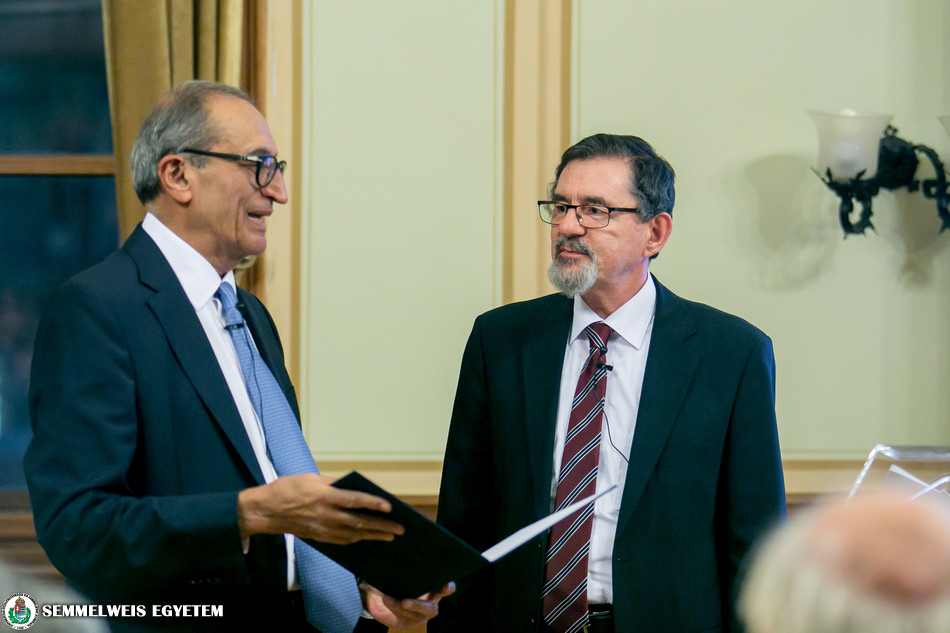 This year the award was handed over for the eighth time by Semmelweis University. The previous awardees are: Dr. Jeremy K. Nicholson (2010), Sir George Radda (2011), Dr. Péter Somogyi (2012), Dr. György Oláh (2013), Dr. György Klein (2014), Dr. Tomas Hökfelt (2015) and Dr. Stefan W. Hell (2016).
This year the award was handed over for the eighth time by Semmelweis University. The previous awardees are: Dr. Jeremy K. Nicholson (2010), Sir George Radda (2011), Dr. Péter Somogyi (2012), Dr. György Oláh (2013), Dr. György Klein (2014), Dr. Tomas Hökfelt (2015) and Dr. Stefan W. Hell (2016).
On the day after the award ceremony, a scientific symposium entitled “The cellular and molecular mechanisms of inflammatory diseases” was organized at the Basic Medical Science Center in honour of Sir Ravinder N. Maini. The event was organized by Dr. Erzsébet Ligeti, Dr. György Nagy and Dr. Attila Mócsai. During the symposium, besides leaders of theoretical and clinical research groups (among them Dr. Edit Buzás, Director of the Department of Genetics, Cell- and Immunobiology and Dr. Gábor Veres, Associate Professor at the 1st Department of Paediatrics) the young colleagues of the Department of Physiology as well as the Department of Genetics, Cell- and Immunobiology also introduced their research findings in the presence of Professor Maini.
Pálma Dobozi
Photo: Attila Kovács – Semmelweis University
Translation: Katalin Illés-Romhányi
